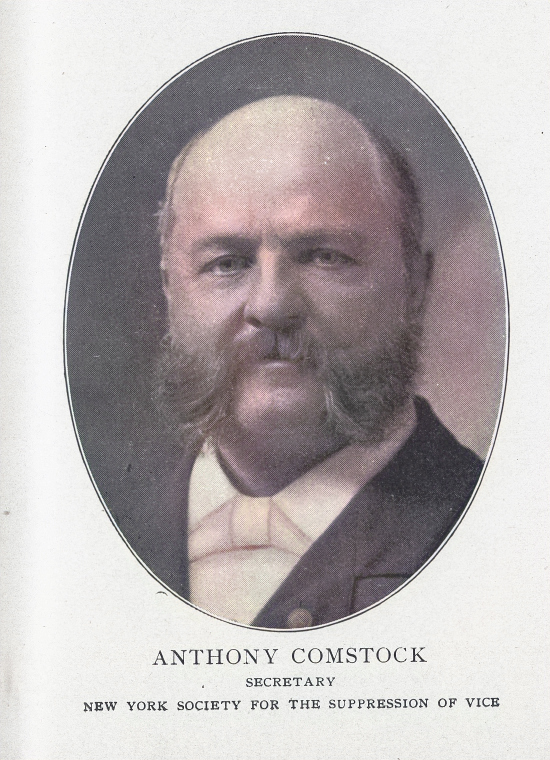Happy Women’s History month! Here at ForPlay Toys we’re taking the chance to explore the history of Women’s Sexual Pleasure.
And unfortunately, at least in the western world, so much of female sexual pleasure has been controlled, suppressed, and stigmatized by men. Worse still, the fight against female sexuality and autonomy isn’t over. The threat of increased legal control over women’s bodies in the US and elsewhere is rising rapidly. And knowledge is power! So let’s take a look at the latest historical bogeyman to leer at us from the past… and possibly threaten our future.
Brace yourselves – let’s take a look at the Comstock Act.
So who was Anthony Comstock? And what was the Comstock Act?

Ugh. This guy. (Originally from the Irma and Paul Milstein Division of United States History, Local History and Genealogy, The New York Public Library. Colorized.)
In the late 19th century, there was growing concern among conservative segments of society. They saw the proliferation of “obscene” materials, including pornography and contraceptive devices, as dangerous to society. Anthony Comstock, was one of the leaders of this movement. Comstock was a fervent “anti-vice” crusader and founder of the New York Society for the Suppression of Vice. He was also a devout Christian, and brought his religious beliefs to his political career. He was against erotica, against abortion, against masturbation, against pornography, against prostitution, against contraception, against sex toys… basically against anything that involved female autonomy over their own bodies. (ForPlay editor note – Gosh, he would have HATED us! We can only hope that our sexual healing might have helped open his mind…?)
Passage of the Comstock Act
The Comstock Act was officially titled “An Act for the Suppression of Trade in, and Circulation of, Obscene Literature and Articles of Immoral Use.” It was passed by the United States Congress and signed into law by President Ulysses S. Grant on March 3, 1873. The Act made it illegal to send “obscene, lewd, and/or lascivious” materials through the mail, including contraceptives and information about contraception. That meant no advertising for such things, either, in papers or magazines. It also meant that erotica, sexual aides, sex toys, and even educational materials got caught in the censorship cross-fire. Even some medical textbooks destined for medical students were turned away by the postal service.
How bad was it? Get this – Doctors and social activists who dared to give women information about pregnancy and contraception were summarily arrested. They faced $1,000 to $5,000 fines and could be sent to prison for up to 10 years. (How’s that for freedom of speech?)
It didn’t go unchallenged. The Comstock Act provoked a huge backlash from activists lobbying for sexual health, contraception, and women’s rights. Critics argued that the Act was unrealistic – that people would still have sex, after all. They’d just have less access to care, fewer options, and a glaring lack of knowledge. But it wasn’t enough – Unfortunately, conservative support meant that the Comstock Act was immensely successful in suppressing sexuality across the board, for decades. And many, many women (and their partners) bore the consequences.
So as you can see, our late Anthony Comstock was a wee bit uptight, and not interested in personal freedoms… Especially for women.
So what was the Impact?
The Comstock Act had a significant impact on freedom of speech and reproductive rights in the United States. The language was so broad, and so open to interpretation, that it basically shut down most exchange of information, goods, or services related to sexuality. It led to the suppression of a wide range of materials – even vitally important educational materials including medical textbooks, novels, and pamphlets discussing contraception and sexual health. The Act also limited access to contraceptives, contributing to the lack of reproductive rights for women during this time period, and many unwanted pregnancies. Many of these pregnancies were then either traumatically and illegally terminated, or brought to term under duress. Under these dire circumstances for women (and those who loved them), sex toys and erotica were, understandably, an afterthought. But the suppression of sexuality contributed to demonization and stigmatization of sexuality and education. And if anyone dared send a sex toy, or pornography, through the mail, it was likely to be seized and destroyed. Worse, its senders were then liable for legal consequences.
Legacy of the Comstock Act
The Comstock Act was eventually weakened and partially repealed over time. The advent of the birth control movement in the early 20th century, and subsequent court rulings, had a lot to do with eroding its power. But its legacy continued to influence attitudes towards sexuality and censorship in the United States – and still does today. Parts of the Act remained in effect until the 1970s, and it serves as a reminder of the ongoing tensions between freedom of expression, public morality, and reproductive rights in American society. It’s a vestige of the Puritanical roots of the United States, and proof of what happens when the separation of church and state erodes.
The Future
Unfortunately, we’re once again in a period of rising anti-sexuality, especially when it comes to reproductive health and women’s bodies. With the repeal of Roe v Wade, the end of IVF in Alabama, the right’s efforts to ban mifepristone, and the criminalization of abortion in state after state, the political right has made no bones about wanting to use the Comstock Act once more. Their goal is the end of abortion, but it won’t stop there – they have been crystal clear about wanting to end contraception, and recreational sex, too. If they can reactivate the Comstock Act, they may successfully put into place laws against transporting contraception, abortion pills, erotic materials, and yes, even sex toys by mail.
If you believe in personal autonomy, and individual rights and freedoms, take this Women’s History Month to find out about the political representatives that will continue the right to expand freedoms, rather than restrict them. And in the meantime? Celebrate your freedoms now! Enjoy your body, send a vibrator through the mail, revel in ethical and feminist porn. You deserve control over your own body, and you deserve to enjoy it. We just might have to work hard, together, to keep it that way.
Here’s to healthy sexuality, education, autonomy, and power over our own bodies. Happy Women’s history month. Keep fighting the good fight!

